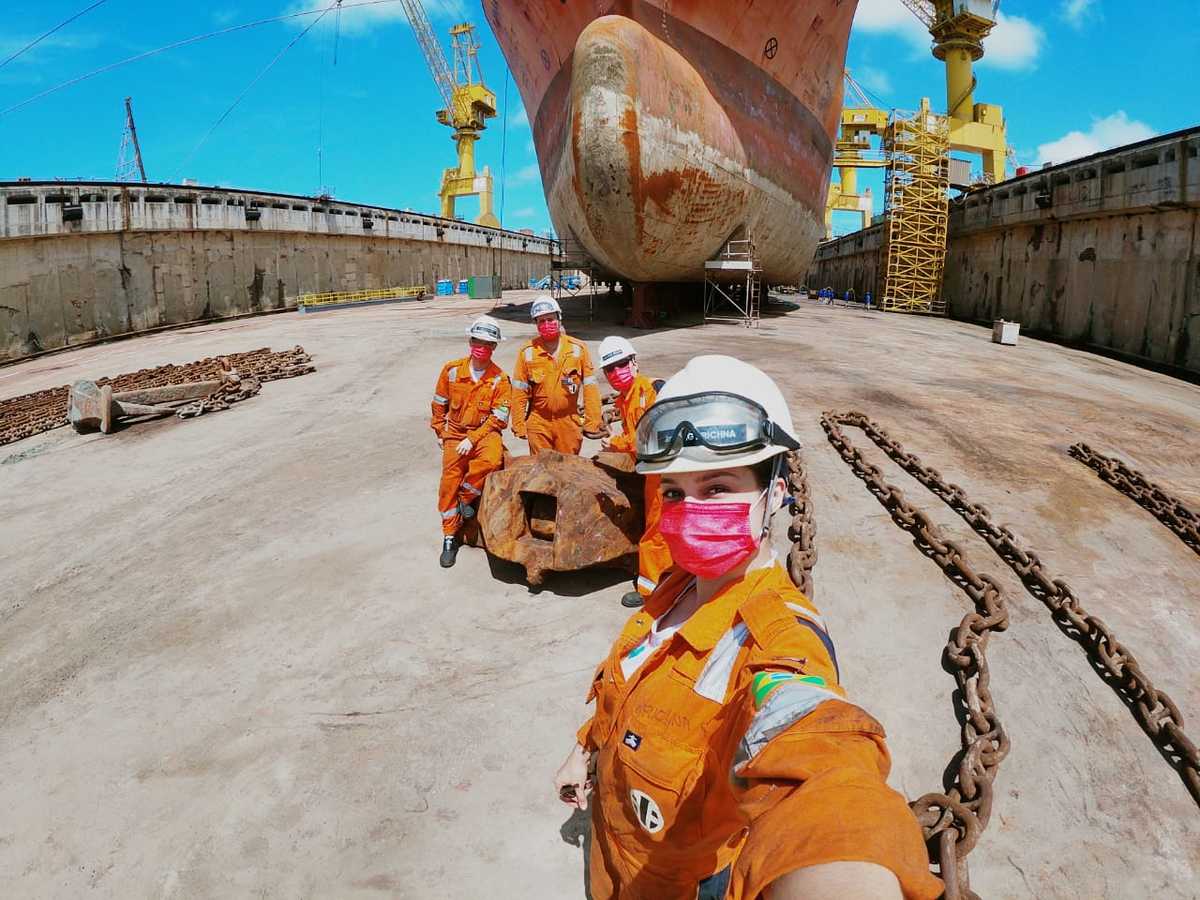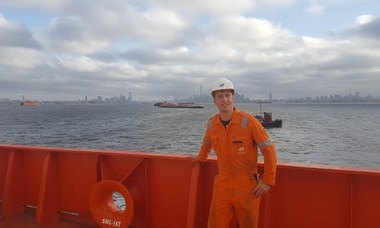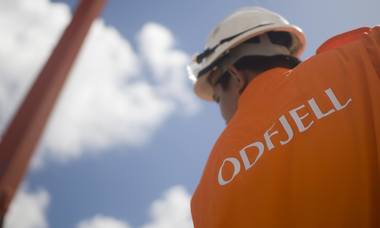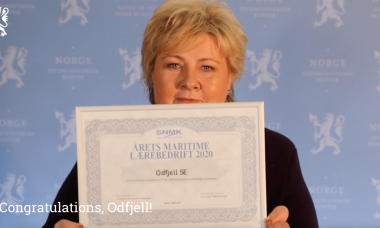Flumar, a wholly-owned subsidiary of Odfjell based in São Paulo, is on the lookout for talented young officers. Four of its most promising future leaders tell us what it’s like to be a seafarer onboard, from enduring long shifts day and night, to visiting new places for special drydock projects, caring for the ship like it’s their babies, and enjoying the amenities on board. Though challenging, they describe an enviable, exhilarating and enriching career.
The sea life, an irregular routine
“I only just woke up,” Gabrielle Matos Dias Michel says, a little bleary-eyed but cheery, of the short rest she’s had in her cabin since coming off her night shift at 06.00 am. “Now that we’re in port, we do six on, six off. From 00:00 to 06:00 and 12:00 to 18:00, I do watches. We have a different schedule when we’re at sea: four on, eight off. I work from 00:00 to 04:00 and from 12:00 to 16:00, plus two extra hours.”
As a second deck officer on board the chemical tanker Flumar Brasil, the 30-year-old is in charge of ensuring the bridge’s communication equipment functions, navigation, planning the passage from port to port, and keeping the bridge library’s publications up to date.
A year into her position, after moving up the ranks since joining Flumar in 2018, she says she enjoys the variety her job provides the most: “We have a routine, but every day is different. We are in different locations, and there’s plenty to do.”
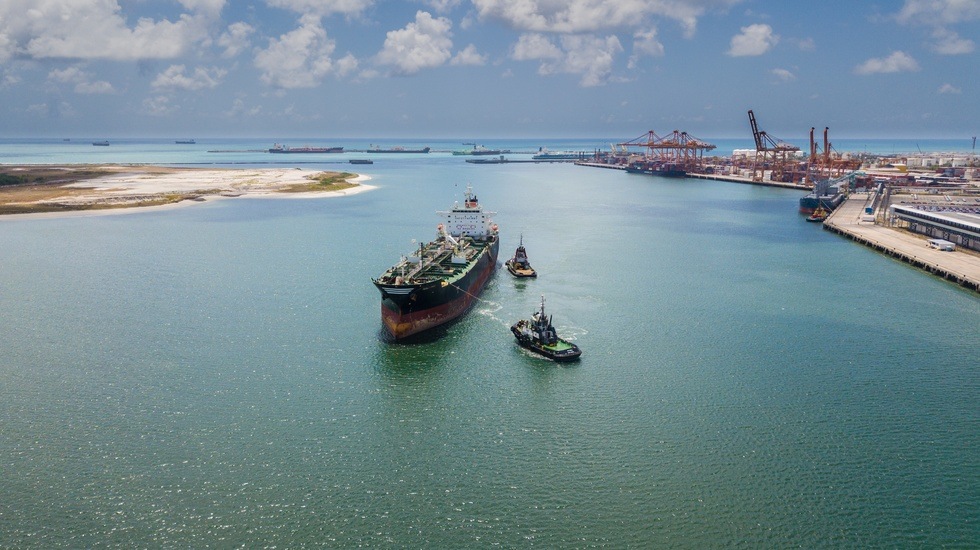
Flumar Brasil is a 2010-built, 51,188 dwt chemical tanker, servicing customers at the Brazilian coast and the Mercosul countries. Photo by EAS.
Making the journey to shipping
Gabrielle fell into merchant shipping by chance, having no prior experience with ships and being the first in her family to do so. She made her way through one of the two three-year marine academies run by the Brazilian navy (as all Brazilian seafaring officers do), followed by a year-long cadetship at another company in 2014.
“When I was with my previous company, the ship I was on was berthed next to a Flumar ship, and it was this ship, the Flumar Brasil, itself,” tells Gabrielle. “We decided to pay a visit, and when I first boarded, I was impressed by how clean the environment was. I had lunch here and spoke with the other officers. People were happy.”
Within the year, Gabrielle was onboard her first Flumar ship, the chemical tanker Bow Oceanic, and has worked her way through the Bow Atlantic via drydocking stints to land full-circle back at Flumar Brasil today.
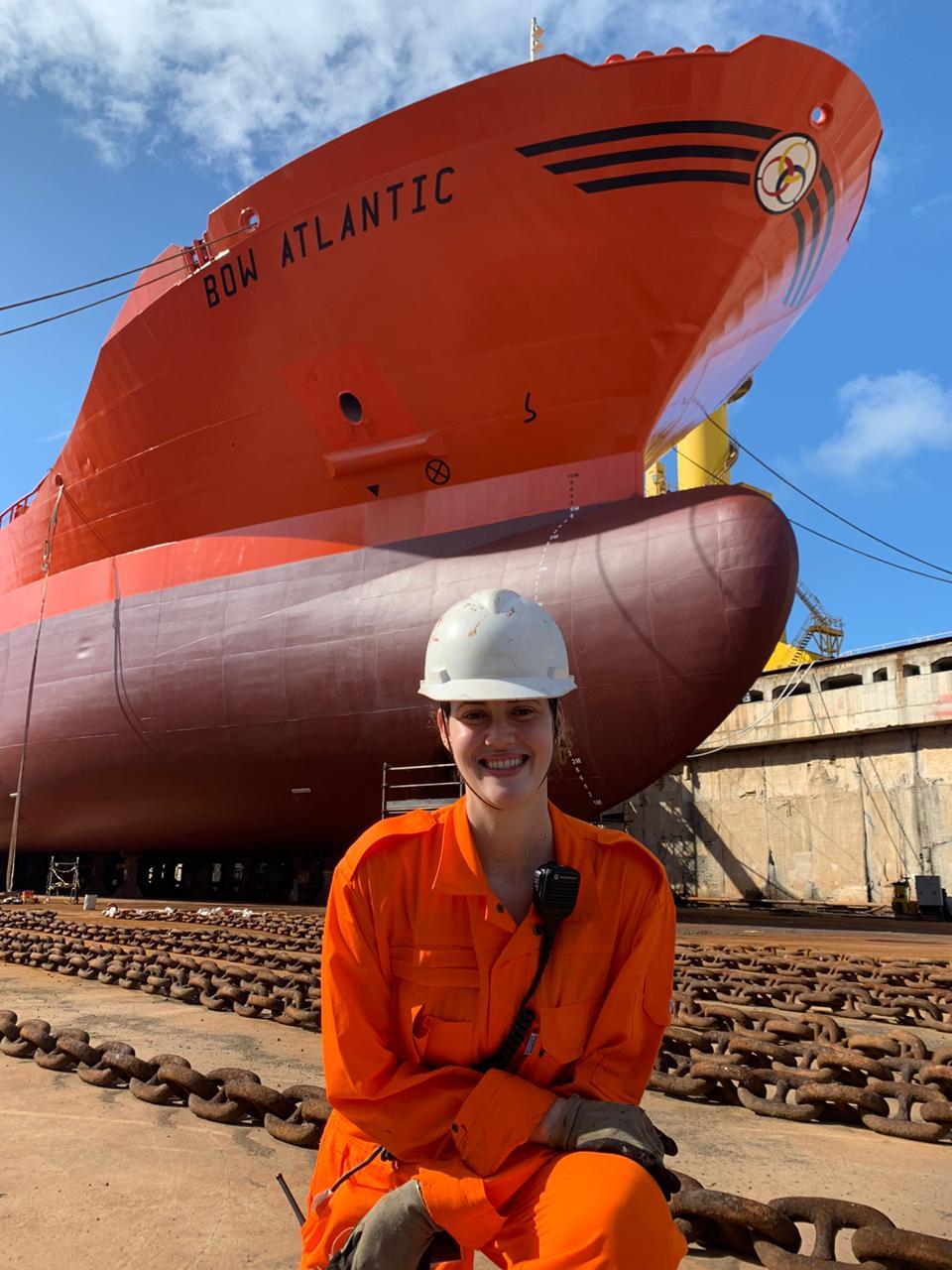
During the last drydock, Gabrielle assisted the other officers in loading and unloading the ship. Here with the 1995 Norwegian-built, 17,460 dwt chemical tanker Bow Atlantic.
Matheus Oliveira Bernardes Costa vividly recalls his start at Flumar – from the first email from the crewing officer to his interview at the Flumar office.
“After they chose me, I was given the opportunity to take an electronic nautical chart course from my marine superintendent, who gave me the best lesson about collision regulation I’ve had in my entire life,” says the 28-year-old third deck officer, who just celebrated his third anniversary in Flumar. “He really opened my eyes to the various scenarios that could occur during my navigation watch. The first thing he said to me was that I was responsible for every soul on board. That hit me very hard.”
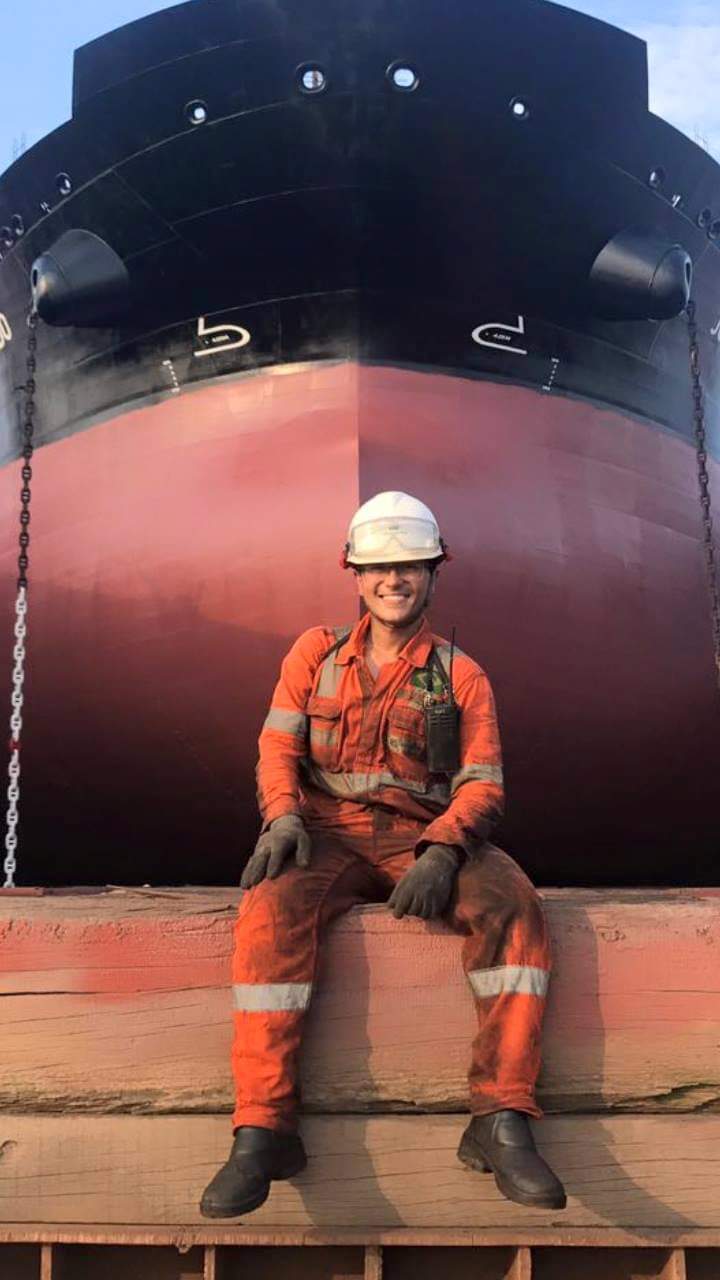
Matheus tells us from his hometown in São Paulo, Brazil’s economic center close to Santos, home to Latin America’s largest port, that his career in shipping really began when he was ten years old. He was brought to join his father at work, introducing him to all the ranks onboard and piquing his particular interest in navigation. Funnily, his brother, who also came along but became seasick while the ship was at berth, grew up to be a lawyer instead.
Lifelong learning – lifelong career
Gabrielle and Matheus are just two outstanding young officers whom crew coordinator Yasmin Gonçalves is counting on as she has been tasked with keeping an eye out for young, up-and-coming talent.
Unfortunately, there is a scarce talent pool that has been limited by a lack of training facilities and competition from offshore. Despite the limitations, Yasmin has found a good crop of ambitious and enthusiastic young officers that are serious about their careers in Flumar. And to help these officers navigate the career ladder, Yasmin and her team are developing a career-planning blueprint. This will include extending seminars, which are currently primarily aimed at senior officers, to junior officers.
“Every week, I speak with captains, chief engineers, and chief officers because it’s a great way to get feedback while developing the training plan. These talks help us find promising officers.”
Matheus, who was drawn to Flumar because of its long history and widespread respect, is mindful of its investment in its employees’ careers and training, as is Gabrielle. The latter appreciates that the young officers are rotated around all the vessels, so they become acquainted with each ship.
“My evaluations and appraisals give me great confidence because I know that hard work will be rewarded,” says Gabrielle, who aspires to be the first Brazilian female captain at Flumar and to inspire younger girls who want to work in this industry.
One of the most immersive ways to learn about the ship is by taking part in drydocking operations, an intense and complex exercise in which the ship is taken to a service yard for maintenance and repairs. And fortunately for our young officers, all three Flumar vessels were drydocked in 2020, this time at a new local Brazilian yard under fourth-generation shipbuilder EAS. As the company expanded into ship repair in 2020 and 2021 in Suape, Flumar was the first to put it to the test.
At drydocks, the foot traffic and flurry of activity may appear chaotic to outsiders, but officers Gabrielle and Matheus describe the experience as a haven for learning opportunities.
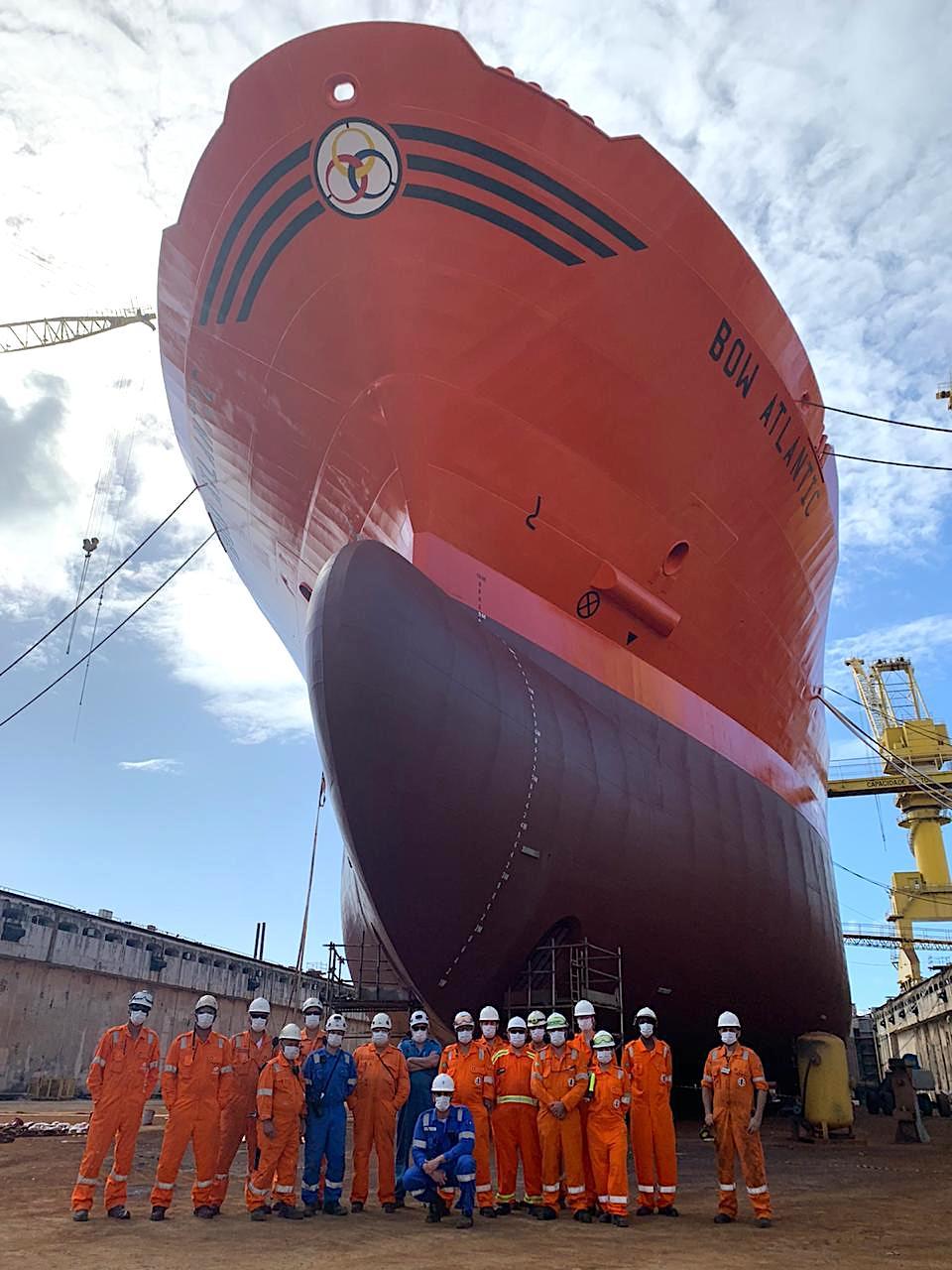
- Flumar’s ships are very ahead of their time, says Matheus. - The ship I'm working on now is from 1995. When this ship was built, it had to be the most modern ship available at the time. The other Flumar ships are also in good condition. The deck has been well-treated and maintained. When clients see a good ship like that, they say to themselves, 'Well, I want this ship working for me.' This significantly impacts the work done on board because I consider this to be our second home. We want to keep them clean, well-maintained, and organized as if they were our home.
A young officer, eager to prove his worth, volunteered for all three dry-dock projects.
“I'm attempting to prepare myself for the position of chief officer,” says Rodrigo Matheus Carneiro Mergulhão, 27, who sees the drydock assignments as critical to his future ambitions. "You must know everything about the ship. And parts of the ship, such as the ballast tank, are only visible when the ship is docked.”
The former engineering student, who joined Flumar in 2017 fresh out of merchant navy school, is eager to advance within the company, much like the captains he's worked with, who began as deck cadets too. As a result, he is deliberate about the skillset required to advance. “I was trying to find a company with tanker ships because those who can work in a tanker ship can work in just about any other types of ships as well – but not the other way around,” Rodrigo says of the advice he received from his friends who worked at Flumar. “It's more difficult than other ships. Everybody knows that.”
A demanding but exhilarating occupation
Krichna Ferreira Leonor agrees. The 30-year-old Rio-based third engineer focused her internship search (after leaving a position as a pilot cadet) on companies with tanker ships because they offer more learning opportunities.
Krichna, who is in her second year at Flumar, is primarily in charge of auxiliary machinery like boilers, pumps, and sewage treatment systems, as well as safety equipment like lifeboats, emergency diesel generators, and water, oil, and fuel treatment and analysis. “You have to know the equipment because the equipment speaks,” says Krichna. “So we have to know what they are saying before they cry. They're like babies.”
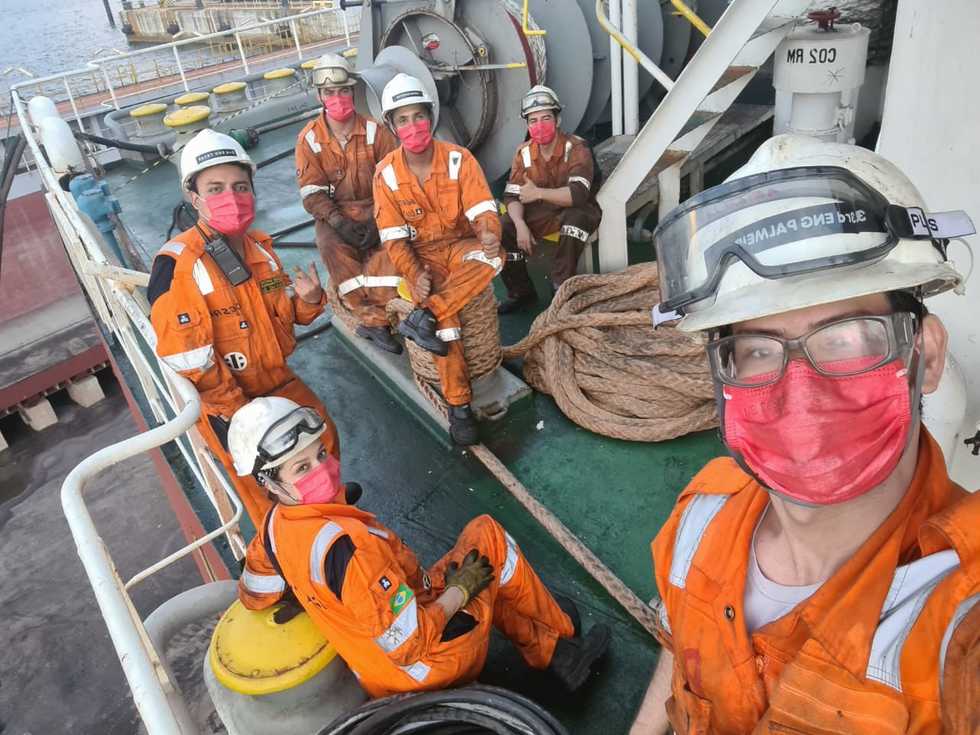
The young officers are looking forward to exploring the Flumar fleet during their career.
As Krichna describes working in a steaming hot engine room, the job is not without its trials. It is one that is complex and requires “100% commitment” away from home and family. Still, she is upbeat and seems to thrive under challenging circumstances. “It's quite dynamic,” says Krichna, who refers to non-seafarers as “earthlings”.
“Every shift is different, but I enjoy being challenged and solving problems daily. My favourite part is being 100% committed to the job while also being 100% on vacation.”
Safety first, always
Despite the tough and demanding environment, safety is foremost on everyone’s mind at Flumar, according to Gabrielle.
“Flumar and Odfjell are concerned about safety, and this is the first step because we all want to return home safely. That's the main thing."
Flumar’s strict safety procedures are so well-known, it’s even what’s attracted officers to join, according to crew coordinator Yasmin.
It's even more impressive that even through the turbulence of a worldwide pandemic, these standards have been maintained, thanks to Yasmin' team's hard work, dedication, and perseverance in managing the chaos of a global crew change crisis behind the scenes. And the result of Yasmin' team's efforts speaks for itself. “As far as I know, we are the only Brazilian Cabotage company that did not bring Covid onboard,” says Yasmin.
Colleagues – friends – family
“With the pandemic, the relationships onboard have become even more important,” officer Matheus says of one significant benefit of the crisis.
“It's critical to have a positive relationship on board, which is why I'm staying in Flumar and not moving offshore or anywhere else. We work as coworkers but also as a family, and friends.”
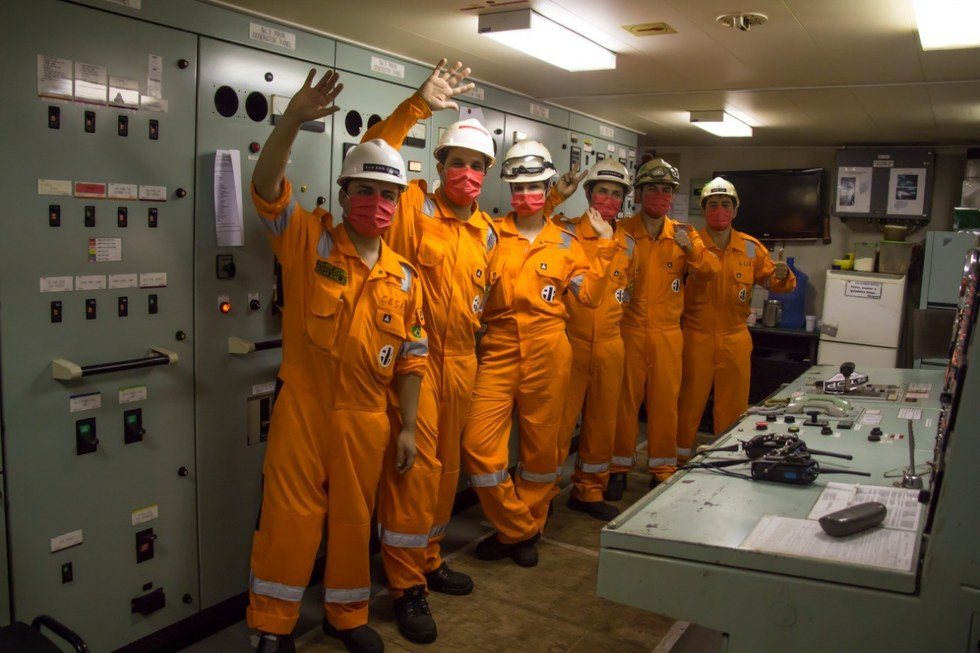
Matheus believes that one of Flumar's greatest assets is their concern for every crew member. One example: A couple of years ago, his captain went to great efforts to get him to the church on time for his wedding in 2019.
“We have 130 employees,” crew coordinator Yasmin says. “It isn't a large number. We know them by name. We know a little bit about their lives. It's good that they feel important and that we care about them. Of course, I will not solve all of their problems or make all of their dreams come true, but we are here to listen and help as much as we can.”
According to Yasmin, officers are knocking on the door for opportunities to join Flumar also because of its reputation as a cooperative workplace, which she humbly dismisses as simply part of her job. More importantly, this pleasant atmosphere onboard fosters a thriving environment for young officers like Krichna to grow and learn.
“Everyone, from HR to the ship, always helps me,” she says.
“People are eager to assist, watch you grow, and teach you. Nobody hides their knowledge. I can learn with the wipers, the electricians, the chief engineers, the second engineers. I'm not sure if I'd have that in another company.”

Meet-up in front of a stripped Flumar Maceio before the 2006-built chemical tanker gets a brand new coating.
Breaking the glass ceiling
This friendly and empowering environment is especially heartening given how intimidating it can be to be a minority in the maritime industry, where only two percent of the world's 1.2 million seafarers are female.
Krichna has been able to prioritize her role as an engineer over her gender.
“I don't see myself as a woman first; I see myself as an engineer,” she says. “I don't think about it anymore, and neither do my colleagues. When I first arrived, it was 'Woah!', but I've never thought, 'I'm a woman. Poor me.' I'm very girly. In the engine room, everyone is using my pink and girly notebooks. When I'm not sure who my crew is, I think about the group dynamics. After that, I'm smiley; I'm myself. Fortunately, I have only had positive experiences.”
Meanwhile, Gabrielle acknowledges the obstacles that remain, having been the sole woman on board in a previous company, which she says is quite normal in the industry. “Of course, there are challenges,” Gabrielle says. “It depends on who you have onboard. You might have to work a little bit more than other officers to prove your worth, or you have to behave a certain way.”
Fortunately, her experience in Flumar has been more positive. “We have a majority Brazilian crew that is a little bit different,” Gabrielle explains. “They have all worked or studied with women since they were young, while in my previous company, I worked with other cultures where the women were seen as less than the men. But in Flumar, I feel very, very comfortable.”
International vibes
Plus, as opposed to the more localized business landscape that its Brazilian competitors can provide, Flumar is an international company and able to provide its trainees with opportunities all over the world. Rodrigo learned in greater depth comparing his drydocking experiences in Europe and Brazil, and aspires to work alongside other nationalities like his colleagues' training in the Balkans and Mount Florida (in Scotland).
As Gabrielle, who traveled outside of Brazil to Poland for her first dry-dock last year via Le Havre in France and Rotterdam in the Netherlands – on her first international flight – puts about one of the things she enjoys most about her job:
“My office is constantly changing. I see sunrises and sunsets. Every day brings a new port.”
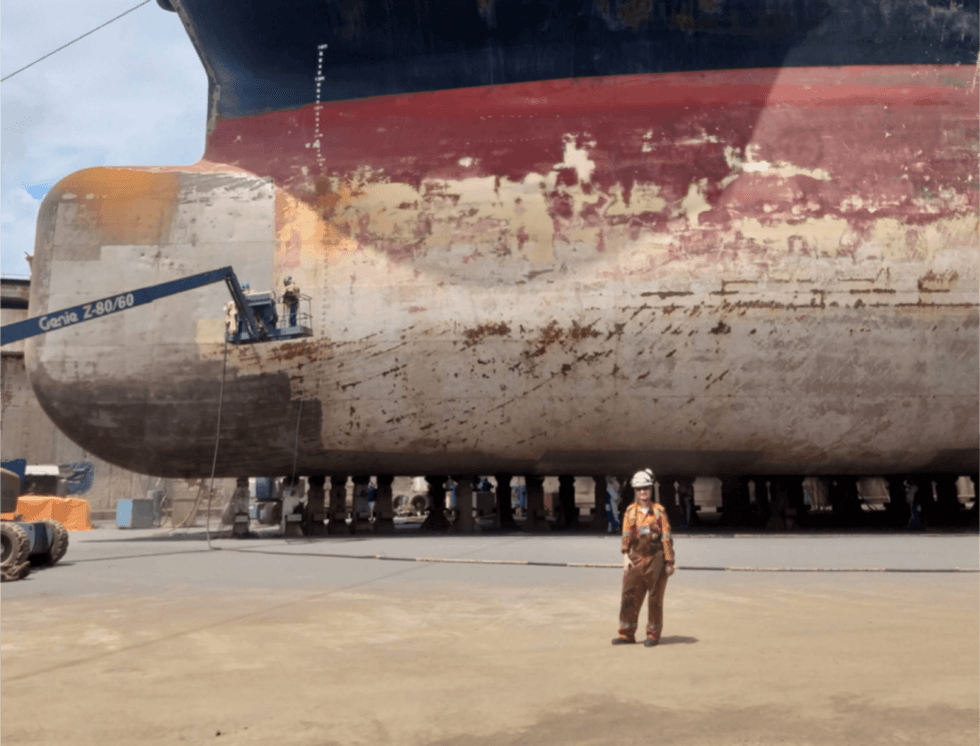
Krichna in front of Flumar Brasil at the start of the drydock when the coating is removed. At drydocks, propellers and rudders, usually unseen underwater, loom like giants over their minuscule human caretakers.
A bright future
As we wind down our interview, Matheus puzzles over why many seem to undervalue a career in the merchant navy.
“People think it's a job for Europeans, Americans, and Asians, but it isn’t; there is a school for it here in Brazil, for Brazilians.”
As he and his three fellow officers can attest, there is a bright and fulfilling road ahead, especially in Flumar, where there is a welcoming team to help you grow and fulfill your potential if you should seek it. As Gabrielle nails it on the head:
“If you don't see yourself in a normal career, and you're looking for something different, I think this industry is a good choice.”
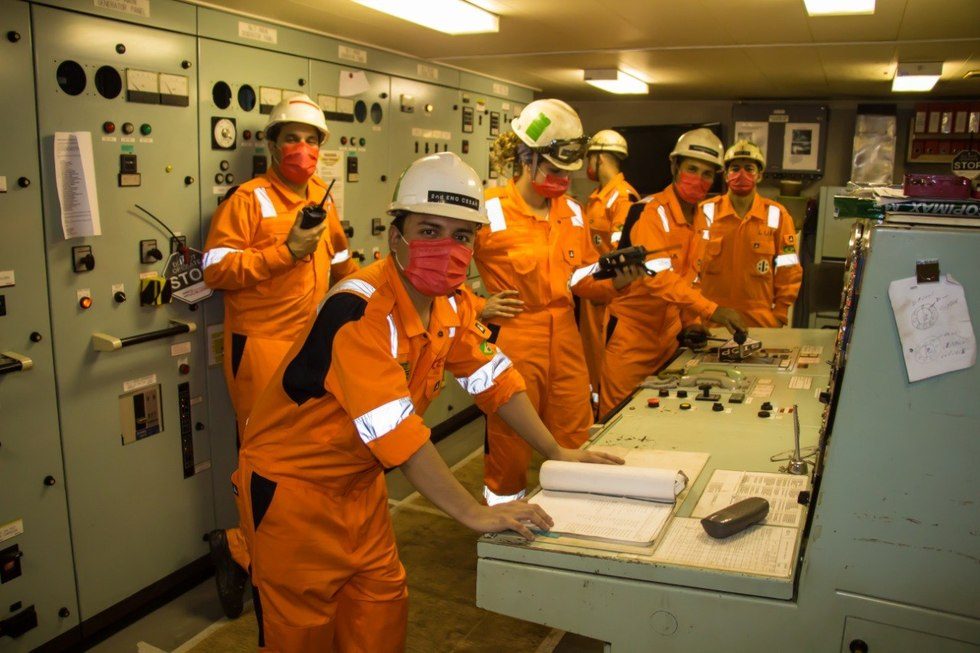
The good life at sea, in a nutshell
Learning opportunities and career advancements are excellent criteria for choosing a trading company, but our rising young sailors tell us that Flumar's onboard amenities are also crucial to their quality of life.
Gabrielle Matos Dias Michel, 30, second deck officer
– Wi-Fi, especially. It's not just for fun; it's also for communication with family.
Krichna Ferreira Leonor, 30, third engineer
– The food is very good, like getting fat good. You don't want to stop eating. The cabin is like a palace and better than many of the apartments and rooms I've lived in.
Matheus Oliveira Bernardes Costa, 28, third deck officer
– In this pandemic situation, we need to find ways to not think about it. When I'm not working, I really like to stay out of my cabin interacting and socializing with the other crew members. We like to watch movies together in the living room, read books – I really like investment books – or just chatting in the mess room.
Rodrigo Matheus Carneiro Mergulhão , 27, third deck officer
– I really enjoy going to the gym. When I choose a ship, I like to know about this and their Wi-Fi because we will be gone for a long time.
Written by Zayana Zulkiflee
